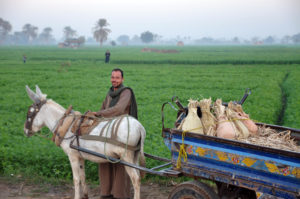In the midst of heightening violent conflicts in the Middle East and North Africa region in 2010, the International Food Policy Research Institute (IFPRI) conducted the first extensive country-specific research, How to Build Resilience to Conflict, with funding from the International Fund for Agricultural Development (IFAD). The study evaluated the links between conflicts, food and nutrition security, and rural development, and identified policies to enhance the resilience of those affected, particularly the rural population. The project’s researchers analyzed conflicts in Egypt, Somalia, Sudan, and Yemen.
The joint study presented significant evidence that food insecurity is one of the main drivers of conflict. Therefore, policy makers need to prioritize food and nutrition security not only to help people recover from conflict but also to minimize future conflicts. To assist policy makers in developing sound food and nutrition security policies, in 2013 IFPRI collaborated with IFAD, the IFPRI-led CGIAR Research Program on Policies, Institutions, and Markets (PIM), and other partners to develop and launch Arab Spatial. This is an online information storehouse that aggregates food security and development information from MENA governments and international institutions.
IFAD and IFPRI’s work on conflict encouraged strong commitments from governments and the international community to champion food and nutrition security. In 2014, the Minister of Water Resources and Irrigation in Egypt drew from the joint research when he discussed the ministry’s strategy for achieving food security and the role the water sector can play. In Yemen, international donors made a strong pledge of US$ 7.5 billion in 2012 toward the country’s development.
Arab Spatial has been endorsed and used by international organizations, think tanks, and universities. From 2013 to July 2016, the website had more than 27,000 page views. More recently, IFAD has used Arab Spatial to inform regional and country policies and resource allocation. At a joint workshop in 2014, "Enhancing Resilience to Conflict in Arab Countries through Research and Arab Spatial 2.0," the director of IFAD’s Near East, North Africa, Europe and Central Asia division noted, the "tool will further help IFAD in project design and targeting, and will make IFAD projects more sustainable and impactful." The successes of Arab Spatial led to the creation of four country-specific spatials by IFPRI, IFAD, and other partners in 2014 and 2015: Iraq, Kyrgyzstan, Palestine, and Yemen. Yemen Spatial is currently helping the government monitor the implementation and impact of their National Food Security Strategy. Since Iraq Spatial’s inception in 2014, it has identified key policy and regulatory constraints to the country’s agricultural productivity, which has informed the government’s policy and reform agenda. Lebanon Spatial is scheduled for release in late 2016.
For more information on IFPRI's work in partnership with IFAD, please go to this brochure.



